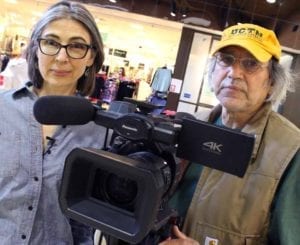Filmmaker Stillman’s
Next Project: Poverty
In Otsego, Delaware
By LIBBY CUDMORE • Hometown Oneonta & The Freeman’s Journal

ONEONTA – Filmmaker Joe Stillman wants to open people’s eyes to what he calls “The Invisible Class.”
“In Otsego County, the poverty rate is 16.5 percent,” he said. “In Oneonta, it’s 29.5 percent. That’s one in three. These are our neighbors, friends, relatives and neighbors, people we play with, shop with and work with.”
Now, home from promoting an award-winning documentary on LBJ’s crusading Attorney General Ramsay Clark, Stillman wants to reveal “Faces of Poverty” in his next documentary.
“I want to put a face to the struggle of low-wage earners,” he said. “They’re making our food, washing dishes, waiting tables. And we take them for granted.”
He’s interviewed Mayor Gary Herzig and Congressman Antonio Delgado, D-19, as well the Catholic Charities and Opportunities For Otsego leadership.
He is collaborating on the film with Rev. Dana Horrell, husband of First United Methodist pastor Rev. Marti Swords-Horrell, and Jeri Wachter, a publisher in Gilbertsville.
“We feel the best way to tell this story is for a low-wage earner to tell their story,” he said. “And a lot of people don’t want to say, ‘I’m working three jobs to make ends meet.’ It’s embarrassing, but without these people, we can’t tell the story.”
Stillman set up his camera Saturday, April 13, in Southside Mall, asking shoppers what they think poverty is. “Some people thought the poverty rate in Delaware County was 50 percent,” he said. “It’s really much lower – 16.5 percent – but what people see is different than statistics, and that tells us that maybe the statistics are off.”
In Otsego County, 44 percent of people in poverty are single mothers with kids, and many are working multiple part-time jobs to survive. “There’s this stigma attached to the poor that they’re lazy and don’t work,” he said. “But we’re going to bust that myth.”
There are multiple factors in generational poverty, including low-paying jobs, lack of housing and lack of public transportation.
“The average rate around here is minimum wage, $11 an hour,” he said. “But if you don’t have a car and you can’t afford housing in the city near public transportation, it’s difficult to live above the poverty line. Student and baseball rental housing is displacing the normal family rental.”
Additionally, the cold winters force low-income earners to often chose between heat and other necessities. “They have to make these difficult choices, such as buying food or medicine. And God forbid there be a medical emergency, such as an accident or a heart attack.”
If someone qualifies for food stamps, it’s no more than $180 a month. “You try to feed a family for $180 a month,” he said. “It’s impossible.”
And once generational poverty sets it, it can be hard to break out of. “The family is living day to day,” he said. “They’re trying to figure out where their next meal is going to come from. The kids might be out mowing lawns to help support the family, but that means they aren’t participating in school activities. There isn’t money for sports equipment or field trips. Education increases the chances for a better job, but economically, it’s not an option – that kid might have to go right into the workforce.”
The key, he said, is that more employers need to offer a living wage for entry-level labor.
“A living wage is $24 an hour,” he said. “But we couldn’t find one employer who paid that, So even if you’re working 40 hours a week, at minimum wage, after taxes, that’s only about $320 a week. Housing eats up two-thirds of that, and you don’t have healthcare. You’re living in poverty.”
And the effects, said Stillman, can be long-lasting. “Economic stress causes suicide, divorce, abuse and addiction,” he said. “The byproducts have a devastating effect on communities.”
If interested in speaking with Stillman, he can be reached at (607) 287-5175 or jcstillman@facesofpoverty.today.
“This is a story about courageous people,” he said. “We want to profile people to tell their stories, and hopefully inspire other people who share those struggles.”


Joe, I can add to the poverty in the county. Please contact me at shoeboxbaby@outlook.com